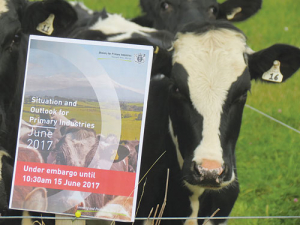NZ Catchment Groups Thrive with ‘Source to Sea’ Approach
The most successful catchment groups in NZ are those that have 'a source to sea' approach.
 MPI’s latest SOPI report says dairying will again dominate the primary sector’s contribution to the country.
MPI’s latest SOPI report says dairying will again dominate the primary sector’s contribution to the country.
A rise in dairy, forestry and horticultural exports spearhead the way for a big rise in the value of primary exports through to 2021, says the Ministry for Primary Industries (MPI) latest Situation and Outlook report.
It says primary exports will rise by 2.4% next year from $37.2 billion to $38b and by 2021 will reach $45b, an average growth rate of 3.9%. Despite a challenging year on farms, dairy exports in the next year are predicted to rise by 10.2%, forestry by 6.4% and horticulture by 5.9%.
Countering these gains is a predicted drop in meat and wool exports of 9.8%.
Over the next five years dairy, forestry and horticultural exports will continue to rise while meat and wool will largely plateau.
The growth predictions are based on the current recovery in dairy prices being maintained, general productivity rises and a large expansion of the horticultural sector, with new, high-value products coming on stream.
The MPI report paints an optimistic picture of future growth, citing economic growth in emerging, high-value markets and demand for the type of food NZ is producing, in particular meat, milk and fruit. It also notes that forestry is finding new markets in regions where there is high demand for construction materials.
But while MPI waxes lyrical about opportunities, it also warns that NZ has to get a better understanding of the dynamics of new markets. It notes in particular the rise and rise of e-commerce in China and the role and influence of the online platform Alibaba on traditional retail outlets.
It notes NZ’s four major markets are now China, Australia, the US and a combination of the EU and the UK. Interestingly, each of these economies have their own set of political or economic problems and the latest election result in the UK will cast another cloud of uncertainty across world markets to add to the disruption NZ already faces.
However, Jarrard Mair, MPI’s director of sector policy, is unfazed by this.
“The key thing to note is that each of those economies is still growing the demand for fresh clean product for human consumption.
“There are growing niches in each of those markets for our high-value products. Out of change there is always opportunity and as everything settles down they find their own new pathways,” Mair adds. “There will be opportunities for us. It will be developing niches and adding value to what we already do. The reality is that the consumer is still demanding NZ products.”
He says there’s been an improvement in businesses engaging with consumers, but he admits more needs to be done. MPI sees strong growth in NZ consumer brands and notes that many companies are investing in this area.
Oddball facts
- While NZ may be focusing on selling lamb to consumers, maybe they should be targeting feline consumers. MPI says that on a per (purr) gram basis, pet food made from lamb earns more than any other lamb cut in British supermarket.
- And if you didn’t already know it, infant formula exports have increased 160% over the past five years.
- Manawatu-Whanganui has more sheep and beef than any other region in NZ.
- NZ is the second-largest log exporter in the world.
- 2016-17 was the largest kiwifruit harvest ever recorded.
- NZ wine is the third-largest wine exporter to the USA by value.
- NZ produces about half the world’s carrot and radish seed.
Agrisea NZ has appointed Craig Hudson as it's new chief growth officer.
State farmer Landcorp, trading as Pamu, is a forecasting a full-year net profit of around $100 million.
Tony Aitken, chief executive of Ruralco, has been awarded the Excellence in Business Leadership Award at the ANZ Business of the Year Awards.
Global trade has been thrown into another bout of uncertainty following the overnight ruling by US Supreme Court, striking down President Donald Trump's decision to impose additional tariffs on trading partners.
Controls on the movement of fruit and vegetables in the Auckland suburb of Mt Roskill have been lifted.
Fonterra farmer shareholders and unit holders are in line for another payment in April.

OPINION: Here w go: the election date is set for November 7 and the politicians are out of the gate…
OPINION: ECan data was released a few days ago showing Canterbury farmers have made “giant strides on environmental performance”.